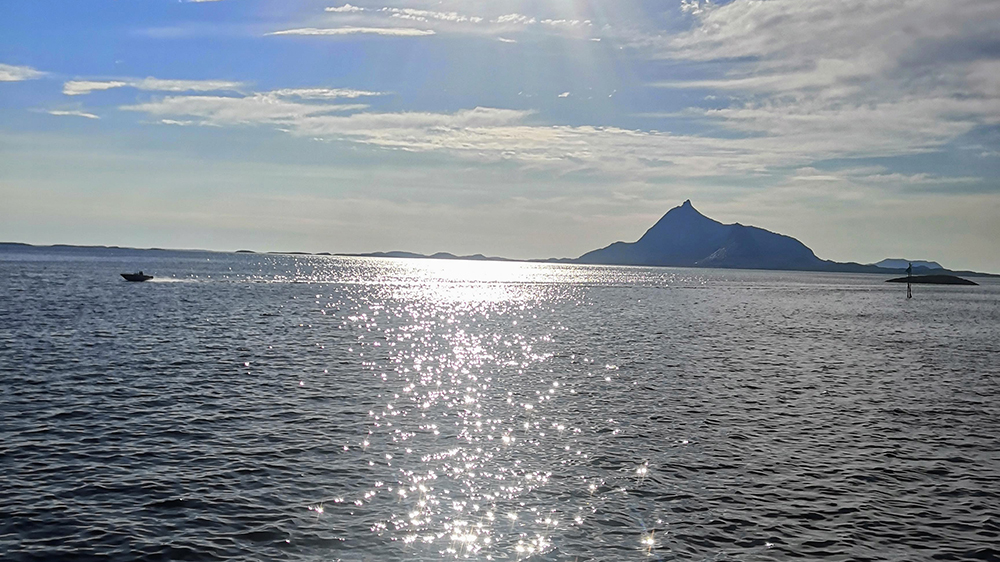At the moment we speak, multiple international and national companies invest in and transform the Sámi Miärralándda. Miärralándda (Miärra = sea or coastland, lándda = land) is an Ume Sámi word that captures the porosity of the land and the sea – worlds that become one, inseparable. Western "stories of progress” materialize in Miärralándda in the Umesámi region, on the coast of Norway, as new land-based salmon farms (iLaks.no, 2023); offshore wind turbines in bodies of water (the Norwegian Sea) (NRK, 2023: NFK, 2023); and onshore wind turbines in the Sámi reindeer herding districts (Fjellheim 2023). In these stories, the governing principal cuts the land/sea/people into different entities, enacting these as colonizable resources, and then appropriates their entanglement through technological innovations. It is in this political landscape that the stories of loss and grief of Miärralándda, as told by the Sámi people, meet neoliberal fantasies of sustainability. Yet, no matter how suppressed, violated, or suffocated, the stories from Miärralándda persist, in dormant reciprocity (Kramvig & Verran, 2019), that can be awakened through storytelling - like Barruk’s vuöllie. In this lecture, we will discuss our ongoing collaborative work that focuses on the processes of colonization in Sámi Miärralándda. We write, talk and act as two friends and colleagues who are curious about the potential of bringing together indigenous Sámi knowledge and feminist posthumanisms.
About the presenters
Britt Kramvig is a professor in the Department of Tourism and Northern Studies at the Arctic University of Norway. Her research centers around questions of decolonization, locally embedded practices of reconciliation, indigenous/Sámi ways of knowing, and storytelling. Kramvig's work is internationally acknowledged as it embodies a unique dynamic interplay between art and science, fostering collaboration across disciplinary fields within and beyond academia. Kramvig has engaged with the concept of landscape through storytelling throughout her academic career, including her work on Sámi art, land- and soundscape and (de)colonialism, as well as work on the Arctic sea- and soundscape, including collaboration with world-known sound artists and international academic networks. She is a descendant of the sea-Sámi’s in Orjješ-Ráisa /Sørreisa that suffered under the weight of colonialism and a scholar that reclaims and recalls her Sámi heritage.
Tarja Salmela is a postdoctoral research fellow at the Arctic University of Norway, within the Department of Tourism and Northern Studies. Her research centers on collective processes of knowledge production within more-than-human, mobile worlds. Over recent years, she has engaged in crafting decolonizing storytelling practices within landscapes that have been overshadowed by tourism and especially touring narratives. Part of this work is dedicated to understanding the relations that emerge through long-term travel in inhabitable vehicles in these contested landscapes. Decolonizing storytelling practices can evoke and revive alternative narratives of the land and its inhabitants, being sensitive to the many times forgotten, silenced or disregarded histories of places 'driven through'. Salmela’s work draws inspiration from feminist new materialisms, feminist posthumanism, and indigenous methodologies. More information about her current project can be found here.
Suggested readings
Kramvig, B. & Verran, H. (2019) Stories, stones, and memories in the land of dormant reciprocity. Opening up Possibilities for Reconciliation with a politics that works tensions of dissensus and consensus with care; in Henriksen, Hydle & Kramvig (eds): Recognition, Reconciliation and Restoration: Applying a Postcolonial Understanding in Social Work and Healing, pp. 163-181, Oslo: Orkana forlag.
Neimanis, A., Åsberg, C., & Hedrén, J. (2015). Four Problems, Four Directions for Environmental Humanities: Toward Critical Posthumanities for the Anthropocene. Ethics and the Environment, 20(1), 67–97. https://doi.org/10.2979/ethicsenviro.20.1.67
The Welcome to the Anthropocene lecture series
The Anthropocene is a widely used term that designates the most recent epoch in Earth's history: an epoch in which humans have radically altered (and disrupted) the climate and ecosystems of the planet.
The annual Welcome to the Anthropocene lecture series invites scholars and researchers across the humanities, social and natural sciences to explore how their disciplines are responding—both to the concept of the Anthropocene, and to the planetary crisis that it designates.
For the 2024 Anthropocene Lecture Series we've invited leading international scholars. Read more about the other lectures in the series here.
2024 Convenors and organizers: Sara Asu Schroer and Anna-Katharina Laboissiere.
How to attend
The 2024 lecture series are free and open to the public. You can either attend in person at the University of Oslo or on Zoom. Register in advance to join.
